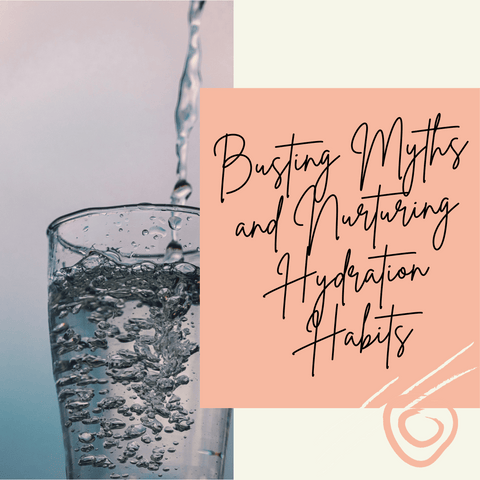The key to overall health and wellbeing is maintaining optimal hydration. The science of hydration extends beyond merely consuming water; it is crucial for almost all biological processes. The main ideas of ideal hydration and the underlying research are summarised in this blog.
Understanding the Importance of Hydration

Understanding the importance of hydration is crucial for maintaining overall health and well-being. Hydration is the process of giving the body enough water to support all of its different activities. It's crucial to remember that each person's hydration requirements might change depending on things like age, gender, environment, and degree of exercise. It's important to pay attention to your body and drink when you're thirsty, since the feeling of thirst is a potent indicator that your body needs hydration. Maintaining health and wellbeing requires staying appropriately hydrated through a combination of water, drinks, and foods high in water, such as fruits and vegetables.
1. The Crucial Role of Water in Daily Life
Water plays a crucial role in daily life, and its importance cannot be overstated. Survival, hydration, energy, digestion, cognitive function, body temperature regulation, joint lubrication, skin health, detoxification, mood and emotional well-being, cardiovascular health, oral health, weight management, household and daily tasks, agriculture and food production, industrial and manufacturing processes, environmental balance, and recreation and leisure are just a few of the important roles water plays in our day-to-day lives. Public health officials must prioritise ensuring that everyone has access to clean, safe drinking water, and everyone has a responsibility to stay well hydrated in order to stay healthy and vibrant. Water is crucial to every part of our everyday lives and is literally the elixir of life.
2. Balancing Act: How Much Water Do You Really Need?
Your demands for water can change depending on a number of variables, including your age, gender, degree of exercise, environment, and personal health requirements. There is no one-size-fits-all recommendation for how much water you should drink, but the following general recommendations can help you determine your hydration requirements: eight glasses per day, pay attention to your body, individual variability, climate, level of activity, pregnancy and breastfeeding, health conditions, ageing, and urine colour. The secret is to develop a healthy hydration habit that fits your lifestyle and unique needs. By staying adequately hydrated, you can support your overall health and well-being. If you have specific questions or concerns regarding your hydration requirements, you might want to speak with a certified dietician or a member of the medical profession.
3. The Impact of Hydration on Your Health
How well you are hydrated has a significant impact on your health because it affects many different bodily systems and activities. Cognitive function, mood and emotional well-being, physical performance, digestion and nutrient absorption, temperature regulation, joint health, detoxification, kidney function, heart and cardiovascular health, weight management, skin health, oral health, urinary health, sleep quality, and decreased risk of heat-related illnesses are some of the ways that staying hydrated affects your health. Drinking water and other hydrating liquids, as well as eating meals high in water content, such as fruits and vegetables, is crucial for maintaining optimum health. Simple strategies to assess your level of hydration and make sure you're fulfilling your particular needs include paying attention to your body's cues for thirst and keeping an eye on the color of your urine.
Hydration Beyond Thirst Quenching

Hydration is about much more than just quenching your thirst. It contributes to overall health and well-being in a variety of ways. Here are some hydration benefits that go beyond simply quenching thirst:
-
Cognitive Function: Maintaining optimal cognitive function requires adequate hydration. Dehydration can interfere with concentration, memory, and decision-making. Proper hydration can aid in clear thinking and alertness.
-
Mood and Emotional Well-Being: Dehydration can have an effect on mood and emotional well-being. It can cause feelings of anxiety, irritability, and fatigue. Staying hydrated can help you maintain a more positive emotional state.
-
Physical Performance: Proper hydration is essential for athletes and individuals participating in physical activities. Dehydration can cause fatigue, muscle cramps, and an increased risk of heat-related problems during exercise.
-
Digestion and Nutrient Absorption: Water is essential for digestion. It facilitates nutrient absorption and aids in the digestion of food in the stomach and intestines. Proper hydration promotes a healthy digestive system, allowing the body to process and extract essential nutrients from food more efficiently.
-
Temperature Regulation: Hydration is an important factor in regulating body temperature. It improves the body's ability to dissipate heat through processes such as sweating, thereby reducing overheating and heat-related illnesses in hot weather or during strenuous activities.
-
Joint Health: Maintaining joint health requires adequate hydration. Water aids in the lubrication and proper functioning of joints. Dehydration can cause joint pain and stiffness.
-
Detoxification: Hydration aids the body's natural detoxification processes. It aids in the removal of waste products and toxins, thereby improving overall health by reducing the accumulation of harmful substances in the body.
-
Kidney Function: The kidneys rely on water to filter waste products from the blood and produce urine. Dehydration can put strain on the kidneys, potentially resulting in kidney stones and an increased risk of urinary tract infections.
-
Heart and Cardiovascular Health: Proper hydration promotes blood volume maintenance, which is essential for cardiovascular health. Dehydration can cause a decrease in blood volume, potentially increasing the risk of heart problems.
-
Weight Management: Drinking water before meals can increase feelings of fullness, lowering calorie intake. This practise may aid in weight management and the attainment or maintenance of a healthy weight.
-
Skin Health: Maintaining healthy, radiant skin requires adequate hydration. Hydration is important for preventing dry, flaky skin and treating skin conditions like eczema.
-
Oral health: By washing away food particles and bacteria, water helps maintain oral health and lowers the risk of dental problems like cavities and gum disease.
-
Urinary Health: Drinking enough water helps flush bacteria and toxins out of the urinary tract, lowering the risk of urinary tract infections.
-
Sleep Quality: Proper hydration can improve sleep quality by lowering the risk of nighttime muscle cramps, which are frequently associated with dehydration.
-
Preventing Heat-Related Illnesses: Adequate hydration in hot weather or during strenuous activities can help prevent heat-related illnesses such as heat exhaustion and heatstroke.
4. Nourishing Your Skin from Within
Adopting a comprehensive approach to skincare that emphasises both the external products you use and the nutrients you provide your body through your diet is necessary for nourishing your skin from the inside out. The foods and nutrients you eat have a significant impact on the health and appearance of your skin. Here are some tips for nourishing your skin from the inside out, including hydration, a diet high in nutrients, antioxidants, healthy fats, protein, collagen production, wholesome fruits and vegetables, selenium, zinc, and probiotics, as well as a reduction in sugar and processed foods, a balance between omega-6 and omega-3 fatty acids, a limit on alcohol and caffeine, sun protection, and dermatologist consultation. While skincare products can be helpful, a wholesome diet and adequate hydration lay the groundwork for skin that is healthy and bright.
5. Hydration's Influence on Hair Health
Water intake is crucial for maintaining healthy hair. Proper hydration maintains the general health and appearance of your hair, just as it does for your skin. Here are some of the ways that hydration affects hair health: hair structure, moisture retention, scalp health, hair growth, elasticity, texture, color retention, and minimising breaking. Water, a balanced diet, omega-3 fatty acids, moisturising hair products, limiting heat style, UV protection, scalp care, routine trimming, and professional consultation are some strategies to maintain optimum hydration for healthy hair. You can encourage healthy, lustrous, and strong hair by upholding good hydration practises.
6. Dehydration: Recognizing the Risks
Your body becomes dehydrated when it loses more water than it takes in, leaving it with inadequate water to perform its regular activities. For the purpose of preserving general health and wellbeing, it is crucial to recognise the dangers and early indicators of dehydration. The following are some important dehydration hazards and signs to be aware of:
-
Dehydration risks include hot weather, illness, chronic medical conditions, medications, and age.
-
Thirst, dark urine, dry mouth and skin, decreased urination, fatigue and dizziness, headache, muscle cramps, and rapid heart rate are early signs and symptoms of dehydration.
Preventing dehydration is critical for overall health and well-being. Make sure to stay hydrated, especially if it is hot outside or if you are exercising. Keep hydrated, pay attention to your body's signals, and seek medical help if you experience severe dehydration-related symptoms.
The Subtle Signs of Dehydration

Dehydration might show up as subtle symptoms that, if caught early enough, can let you take action to rehydrate before the illness worsens. Thirst, dark urine, dry mouth, diminished urination, dry skin, lethargy and weakness, headache, dizziness or lightheadedness, difficulty concentrating, muscle cramps, and dry or sticky eyes are some subtle indications of dehydration to be aware of. It is a good idea to start drinking additional fluids, especially water, to rehydrate if you experience any of these minor symptoms. Pay attention to your body's signals, stay hydrated, and remember to drink plenty of fluids, especially in hot weather or when you're exercising.
7. Unmasking the Hidden Signs of Dehydration
Hidden symptoms of dehydration may not be immediately apparent, but they can point to the need for greater fluid consumption. It's critical to pay attention to these less obvious dehydration symptoms to stop them before they get worse. These covert symptoms of dehydration include a dry or sticky mouth, subtle fatigue, decreased urine volume, dark circles under the eyes, a moderate headache, trouble concentrating, dry skin, joint stiffness, foul breath, food cravings, infrequent tears, an increased heart rate, and decreased sweating. Even before you experience extreme thirst, it is advised to frequently take water and other hydrating liquids. Being well hydrated is essential to general health and well-being since it supports numerous biological processes and lessens the severity of dehydration's effects.
8. Water's Role in Essential Body Functions
The body's ability to function properly depends on water. It is critical to several crucial physiological functions. Transport of nutrients, digestion, temperature regulation, joint lubrication, waste removal, cell function, blood volume and pressure, cognitive function, heart health, respiratory health, skin health, metabolism, digestion health, oral health, and immune function are a few of the important roles that water plays in the body. It is impossible to overestimate the role that water plays in these and other crucial bodily processes. Maintaining a regular intake of water is essential for the body to carry out its numerous activities as efficiently as possible. Staying adequately hydrated is a cornerstone of general health and wellbeing.
9. Hydration for Digestive Wellness
Drinking enough water is crucial for intestinal health. Maintaining appropriate hydration helps support a healthy digestive tract because water is essential to several elements of digestion. Here are some of the ways that drinking enough water supports good digestive health: it helps to break down and moisten food, absorb nutrients, reduce constipation, soften stools, maintain regular bowel movements, prevent dehydration, and lower the risk of gastrointestinal illnesses. Keep in mind that everyone has different demands for hydration, so it's crucial to pay attention to your body's signals and get enough water to support a healthy digestive system. Consult a certified dietician or healthcare provider if you have particular digestive issues for individualised advice.
10. How Hydration Affects Your Cognitive Abilities
Hydration has a significant impact on cognitive abilities, and even mild dehydration can have an impact on a number of cognitive processes. Here are some effects of dehydration on your cognitive functions, including memory, decision-making, problem-solving, reaction time, visual and motor skills, mood, weariness, and linguistic ability. Although the precise mechanisms underlying these dehydration-related cognitive effects are unknown, it is believed that they are caused by decreased blood supply to the brain, changes in neurotransmitter activity, and the brain's general susceptibility to dehydration. It's important to note that the impact of dehydration on cognitive abilities can vary from person to person. Some individuals may be more sensitive to dehydration than others. Therefore, maintaining proper hydration is crucial for optimal cognitive function. To ensure you're well-hydrated, pay attention to your body's thirst cues, drink water and other hydrating fluids regularly, and monitor your urine color as an indicator of hydration status. Staying hydrated is not only essential for cognitive abilities but also for overall health and well-being.
Performance and Age: Tailoring Your Hydration

Individuals' hydration demands may alter as they get older, therefore, it's vital to adjust hydration techniques to each age group's unique needs to preserve general health and maximise performance. Here are some factors to take into account while changing hydration habits according to age:
-
Children and adolescents (ages 2 to 18) have higher water needs, lead more active lives, are more thirsty, and avoid sugary beverages.
-
Adults (ages 19-64) have moderate water needs, maintain an active lifestyle, eat a well-balanced diet, and avoid caffeine and alcohol.
-
Older adults (age 65+) have reduced sensitivity to thirst, aging kidneys, medications, hydration, cognitive function, and maintaining muscle mass.
Monitoring urine color could be a useful metric for determining hydration in people of all ages. While dark yellow or amber urine may indicate dehydration, pale or straw-colored urine indicates sufficient hydration. Maintaining health and well-being necessitates tailoring hydration practises to the specific needs of various age groups. Staying hydrated is an important part of improving physical and mental performance throughout life.
11. Hydration's Influence on Physical Performance
Hydration has a significant impact on physical performance, making it an important aspect of sports and exercise. Maintaining proper hydration can improve endurance, strength, and overall athletic performance. Here's how hydration affects athletic performance:
-
Temperature Regulation: Sweating's primary function is to keep the body cool during physical activity. When you are properly hydrated, your body can sweat efficiently, assisting in temperature regulation and preventing overheating during exercise.
-
Sustained Endurance: Dehydration can cause fatigue and decreased endurance. Maintaining proper hydration delays the onset of fatigue and allows you to exert physical effort for longer periods of time.
-
Cardiovascular Function: Dehydration can cause blood volume to decrease and heart rate to increase during exercise. This can lead to increased cardiovascular strain, which can impair performance.
-
Muscle Function: Water is required for proper muscle function. Dehydration can cause muscle cramps, weakness, and a loss of strength and power.
-
Joint Lubrication: Adequate hydration is important for joint lubrication, which can reduce the risk of joint discomfort and injury during exercise.
-
Energy Production: Dehydration can impair the body's ability to generate energy. This can result in decreased power output and performance in activities requiring strength and speed.
-
Cognitive Function: During exercise, proper hydration is critical for cognitive function. It aids in the maintenance of focus, alertness, and decision-making abilities.
-
Recovery: Hydration plays a role in post-exercise recovery. Adequate hydration supports the body's ability to repair and rebuild tissues, which aids in recovery from physical exertion.
-
Reduced Risk of Heat-Related Illnesses: When exercising in hot and muggy conditions, proper hydration is crucial for lowering the risk of heat-related illnesses like heat exhaustion and heatstroke.
-
Electrolyte Balance: The proper functioning of muscles and nerves depends on electrolytes like sodium, potassium, and magnesium. Proper hydration makes it easier to maintain electrolyte balance, which is essential for physical performance.
12. Age-Related Hydration Needs: What Changes?
The need for water may change as we age. As you get older, it's critical to be aware of these changes and modify your hydration practises accordingly. Here is how hydration requirements can alter as we age:
Children and Adolescents (Ages 2-18):
-
Higher Water Needs: Compared to adults, kids' and teenagers' bodies contain a higher percentage of water. They may be more physically active, and they also have greater metabolic rates. Thus, in order to maintain optimum hydration, they require more water in comparison to their body weight.
-
Thirst Sensitivity: Because children's thirst sensations are not as developed as adults, they may not always recognise their thirst for water. It's important for carers to encourage regular hydration, even if children don't feel thirsty.
-
Nutrition and Growth: In children, hydration requirements are closely linked to growth and nutrition. Proper hydration supports healthy development and can impact appetite and nutrient intake.
Adults (Ages 19-64):
-
Adult Hydration Needs: To stay hydrated, adults typically need a moderate amount of water. However, depending on variables like activity level and climate, individual needs can change.
-
Physical activity: Since many adults are still physically active, it is crucial to stay hydrated while exercising. Pay close attention to sweat loss, particularly when it is hot and humid outside.
-
Dietary Balance: Fruits, vegetables, and whole grains can all help with hydration. A balanced diet should also be consumed. These foods supply vital nutrients and electrolytes in addition to water.
Older Adults (Ages 65+):
-
Reduced Sensitivity to Thirst: Older people may experience less thirst, which makes them less aware of the need to drink water. Even if they are not thirsty, encourage them to drink water on a regular basis.
-
Age-related Kidney Decline: As people age, their kidneys may become less adept at retaining water, increasing the risk of dehydration. Regular hydration is essential to offset any potential losses.
-
Medication: Some drugs that older adults frequently take may have diuretic effects or affect fluid balance. Be mindful of how medications may affect your ability to stay hydrated.
-
Hydration and Cognitive Function: Maintaining cognitive function, which can be a concern in older age, requires proper hydration. Dehydration has been linked to an increase in cognitive decline.
-
Muscle Mass Maintenance: Because muscle holds a significant amount of water, older adults may need to pay special attention to maintaining muscle mass. Dehydration can cause muscle weakness and decreased mobility.
Monitoring urine color can be a useful tool to determine hydration in all age groups. While dark yellow or amber urine may be an indication of dehydration, pale or straw-colored urine is a sign of adequate hydration. For the sake of preserving health and wellbeing, hydration practises must be customised to the unique requirements of various age groups. In order to maintain physical and mental function throughout life, staying hydrated is essential to good health.
13. Special Considerations for Athletes
Due to the demands of their training and competition, athletes have particular hydration needs. Optimising performance, avoiding heat-related diseases, and promoting recovery all depend on proper hydration. Here are some unique hydration issues for athletes:
-
Increased Fluid Loss: When exercising vigorously or for an extended period of time, athletes can sweat out significant amounts of fluid. To keep hydrated and avoid performance decline, it is imperative to replace these fluid losses.
-
Individual Variability: Depending on body size, sweat rate, exercise intensity, and environmental conditions, athletes' needs for hydration can differ significantly. It is critical for athletes to comprehend their unique hydration needs.
-
Pre-exercise Hydration: A properly hydrated start to exercise is essential for performance. Athletes should be properly hydrated before beginning training or a competition. In the days before an event, it is crucial to consume water or another hydrating beverage.
-
During Exercise: Hydration needs to be sustained continuously while exercising. Athletes should drink at regular intervals to maintain fluid balance. Depending on the person's needs, the exact amount will vary.
-
Electrolyte Balance: Sweating causes the loss of electrolytes in addition to water. Electrolyte replacement may be necessary for athletes, particularly during longer and more strenuous workouts. In these circumstances, electrolyte supplements or sports drinks can be useful.
-
Monitoring Sweat Rate: By weighing themselves before and after exercise, athletes can keep track of their sweat rate. They should try to drink about 16-20 ounces (500-600 ml) of fluid for every pound (0.45 kilogrammes) of weight lost during exercise.
-
Heat Acclimatisation: It is important to gradually acclimatise to the heat when exercising in hot, muggy weather. The body can adapt through this process and become better at cooling itself. The process of acclimatisation requires adequate hydration.
-
Rehydration after Exercise: Recovery from activity requires rehydration. Athletes should drink water, sports drinks, or recovery beverages containing carbs and electrolytes to restore lost fluids.
-
Hydration and Performance: Staying adequately hydrated while exercising can improve athletic performance by preventing fatigue, preserving muscle function, and supporting cognitive function.
-
Avoid Overhydration: Some athletes, especially those who compete in endurance sports, may be at risk for overhydration, also known as hyponatremia. Drinking too much water without replenishing electrolytes can result in electrolyte imbalances. Fluid intake must be balanced with electrolyte requirements.
-
Individual Hydration Plans: It is critical to develop an individualised hydration plan. Athletes should collaborate with a sports dietitian or healthcare professional to develop a plan that is tailored to their specific requirements.
-
Hydration in Extreme Conditions: Athletes who compete at high altitudes, in cold environments, or in dry climates may face unique hydration challenges. Adaptation and specialised approaches are required.
Busting Myths and Nurturing Hydration Habits

Keeping adequately hydrated is critical for overall health; thus, it's necessary to distinguish fact from myth in this area. Let's dispel some widespread hydration fallacies and encourage wholesome hydration practises:
-
Thirst is the best indicator of when it is appropriate to drink.
-
You should only drink water when you are sweating or exercising.
-
Clear urine indicates adequate hydration.
-
The universal recommendation is eight 8-ounce glasses of water per day.
-
Caffeinated drinks, such as coffee, dehydrate you.
-
Fruits and vegetables do not help with hydration.
-
It is impossible to overhydrate or drink too much water.
-
Dehydration occurs only during hot weather.
-
Individuals who are thirsty should consume sugary sports drinks.
-
You can never drink too much water while exercising.
Creating a balanced hydration strategy that takes into account daily activities, climate, and individual factors is crucial. You can receive individualised advice for maintaining sufficient hydration by speaking with a healthcare provider or certified dietitian.
14. Separating Fact from Fiction: Hydration Myths Debunked
Keeping adequately hydrated is vital for overall health, so it's important to distinguish fact from myth in this area. Let's dispel some widespread hydration misconceptions and advocate for wholesome hydration practises:
-
Myth 1: You should drink 8 glasses of water (64 ounces) per day. Fact: Each individual has different needs for hydration. There is no set amount of water that applies to everyone. The "8x8" rule is a broad suggestion, although specific needs vary by age, degree of activity, climate, and state of health. Drink when you're thirsty, and pay attention to your body.
-
Myth 2: Clear urine is always an indication of adequate hydration. Fact: Clear urine may be a sign of overhydration. Urine that is pale yellow or straw-colored is a better sign of adequate hydration. Urine that is dark yellow or amber may indicate dehydration.
-
Myth 3: You only need to hydrate yourself when you are exercising or perspiring. Fact: Drinking water is a continuous process. Regular hydration is necessary, not just before and after physical exercise. The body loses water through typical physical processes; therefore, maintaining hydration is crucial for good health in general.
-
Myth 4: Caffeinated drinks, like coffee, cause you to become dehydrated. Fact: While caffeine is a mild diuretic, the fluid content in caffeinated beverages outweighs the diuretic effect. Tea or coffee in moderation can help you stay hydrated overall.
-
Myth 5: You can never consume too much water or become dehydrated. Fact: If you consume an excessive amount of water without replenishing lost electrolytes, you could develop hyponatremia, or overhydration. The balance between fluid intake and electrolyte requirements must be maintained.
-
Myth 6: The best way to know when to drink is to feel thirsty. Fact: While a solid predictor of hydration needs, thirst is not always the ideal one, especially in older adults and small children. To ensure optimum hydration, it's imperative to maintain a regular drinking regimen.
-
Myth 7: Vegetables and fruits do not help you stay hydrated. Fact: Due to their high water content, fruits and vegetables are a significant source of daily hydration. They also supply the vital nutrients and electrolytes needed to maintain hydration.
-
Myth 8: Only in hot weather does dehydration take place. Fact: Dehydration can occur in any weather, including cold and dry conditions. Indoor environments with low humidity can also cause dehydration.
-
Myth 9: People who are thirsty should drink sugary sports drinks: Fact: While sports drinks can be beneficial to athletes in certain situations, they are not appropriate for daily hydration. Water is the best option for the majority of people. Sports drinks are frequently loaded with sugar and calories.
-
Myth 10: You can never drink too much water while exercising: Fact: Excessive water consumption during exercise can cause hyponatremia, a condition in which the sodium levels in the blood drop dangerously low. It's important to follow a personalised hydration plan during physical activity.
15. Practical Tips for Maintaining Optimal Hydration
For general health and well-being, maintaining optimal hydration is crucial. Drink plenty of water, pay attention to your body, carry a water bottle, set hydration goals, monitor urine color, incorporate water-rich foods into your diet, make a drinking schedule, hydrate before, during, and after physical activity, limit dehydrating beverages, hydrate for outdoor activities, educate yourself, hydrate in dry environments, stay hydrated when ill, limit sugary drinks, add flavor with infusions, use hydration apps, and seek professional advice are some practical ways to stay properly hydrated. Keep in mind that maintaining proper hydration is a commitment you make to your health for life. Having good hydration habits can improve your physical and mental performance, give you more energy, and make you feel better overall.
16. Overcoming Hydration Challenges
Overcoming hydration issues can be crucial for sustaining good health, especially in circumstances where it may be more challenging to stay well hydrated. Limited access to water, a busy lifestyle, a lack of thirst awareness, perspiration and fluid loss, travel, medications, and health conditions, a predilection for flavored drinks, cultural or social issues, and worries about overhydration are some techniques to deal with typical hydration challenges. Finding workable solutions that suit your particular situation is frequently necessary while dealing with hydration issues. Maintaining adequate hydration in the face of a variety of obstacles is possible by developing a balanced approach to hydration and being aware of your fluid intake.
17. Tools and Apps to Help Track Your Hydration
A number of tools and apps can help you keep track of your hydration. Reusable water bottles with measurements, hydration apps, smart water bottles, wearable fitness trackers, online hydration calculators, diaries or journals, smart water pitchers, smart home devices, and electrolyte supplements are a few tools and apps that can help you monitor and maintain proper hydration. These programmes and resources can offer important encouragement and assistance for maintaining sufficient hydration. Finding the best tool for your lifestyle can help you meet your hydration objectives more successfully, whether you choose a digital strategy with smartphone apps or a more conventional one, like a reusable water bottle.
Conclusion: A Refreshing Journey to a Healthier You

In addition to relieving your thirst, maintaining proper hydration is essential for your general health and well-being. It's vital to consider the importance of maintaining proper hydration as we get to the end of this journey towards a healthier self. We've looked at the fundamental ideas and useful tips to make sure you're continuously hydrated, from the daily practise of drinking water to the challenges of adapting to various surroundings and lifestyles. Hydration is a straightforward yet effective strategy to improve your physical and mental performance, improve the condition of your skin and hair, maintain digestive wellness, and lower your chance of developing a number of health problems. You now understand how important different life stages—including childhood, adulthood, and aging—are in determining how much water you require. Additionally, we covered the special needs of athletes and how to solve frequent hydration problems. Keep in mind that staying hydrated is a continuous process that demands focus, exertion, and consciousness. You may create hydration routines that are sustainable by paying attention to your body, making a plan that is specific to your requirements, and using the tools and applications that are available to monitor your success. You make a welcome step towards a healthier and more energetic you with each glass of water or sip of hydration beverage. Use the information and realisations you've received on this journey to improve your life and the lives of people around you. You can take care of your health and well-being by making hydration a priority, and you can inspire others to live healthy, well-hydrated lives by doing so. Cheers to a more hydrated, healthier you!










































1 comment
Dr. Supriyo Mondal
Informative article. Thanks for such a lovely, easy to digest blog.
Informative article. Thanks for such a lovely, easy to digest blog.